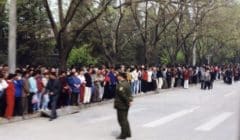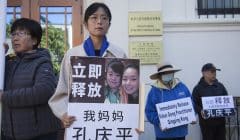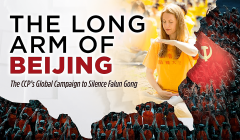The Epoch Times: Chinese Justice in a Spanish Court?
Spanish judge hears victims' testimony in Chinese genocide case
In a groundbreaking case, Chinese victims of rights violations moved a step closer to seeing their abusers held to account when a judge in Madrid listened to their testimony Monday.
“When I was being tortured in labor camps in China, I told myself that one day I would make all of those perpetrators be responsible for what they were doing,” says Zhao Ming, one of three victims who spoke. “Now I am doing what I intended.”
Zhao spent 22 months in Beijing labor camps because he practices Falun Gong, a popular spiritual discipline that was banned in China in 1999. Since then, practitioners have received brutal treatment from the Chinese regime. Zhao himself tells of one occasion when he was shocked simultaneously with six electric batons.
The three victims’ testimony before a judge and prosecutor of Spain’s Audencia Nationale was the latest step in an ongoing investigation into allegations of torture and genocide.
According to Carlos Iglesias Jimenez, a local lawyer representing the victims, it was also the first time a Spanish judge heard official declarations in a genocide case whose victims were solely non-Spanish citizens.
“In other genocide cases, like the ones regarding Tibet or Guatemala, at least one of the victims was of Spanish nationality,” he says.
Thus, besides Zhao, also testifying were an Australian whose husband was tortured to death and a woman who spent a year in a labor camp after being abducted from her home.
The defendants in the case are two top Chinese Communist Party (CCP) officials known for their active role in persecuting Falun Gong—Jia Qinglin from Beijing and Wu Guanzheng from Shandong Province.
According to Iglesias, the focus on Monday was on Jia’s actions because the victims’ experiences were centered on Beijing, where Jia was the top official from 1999-2002. Now ranked fourth in the CCP hierarchy, he reportedly gave speeches urging lower officials to persecute Falun Gong and commended security units for their “success” in the “fight” against the spiritual practice. In 2002, he made the campaign one of Beijing’s top five priorities.
Iglesias also says that though torture, genocide, and deprivation of religious freedom are illegal under Chinese law, to date no official has been investigated or punished for persecuting Falun Gong. On the contrary, they have been promoted.
“What’s most important about this case is the opportunity to seek justice for Falun Gong,” he says. “They can’t get justice in China, so this is the possibility to find justice for victims before a Spanish court.”
What is next?
The investigation follows a Supreme Court ruling from June 2006 that ordered Spanish courts to accept the case based on a law enabling them to exercise universal jurisdiction. This legal principle allows domestic courts to hear cases of genocide and crimes against humanity regardless of where they occur and what the nationality of the defendant.
Should the evidence arising from the inquiry suffice, this could lead to a request for Jia and Wu’s extradition to Spain to stand trial. Though it is unlikely that China would comply, the two could be extradited to Spain should they travel abroad, joining several Latin American officials who have faced that fate.
“I think that in the end, this will finish with the detention of all those responsible for this genocide, whether they visit Spain or another country with which we have an extradition agreement,” says Iglesias, who has filed three criminal complaints against other Chinese officials.
These cases are part of both a broader trend in Spain and a larger effort by Falun Gong adherents and their lawyers to seek redress outside of China. Spanish courts propelled the movement of prosecuting international crimes in national courts when a judge issued an extradition request for Chilean dictator Augusto Pinochet in 1998. More recently, they have begun investigations into genocide in Guatemala and Tibet. Meanwhile, more than seventy Falun Gong cases have been filed in at least 30 countries.
“From Western countries’ perspective, the case is also very important,” says Zhao Ming, one of the victims. “Despite differences in race, culture, and religion between the world’s people, we have some basic, common understandings on human life that we must maintain.”
“Such crimes against humanity like what the CCP is committing in China must be stopped,” he says.






